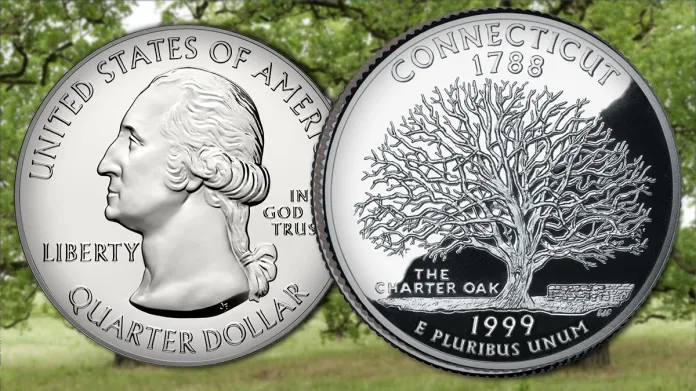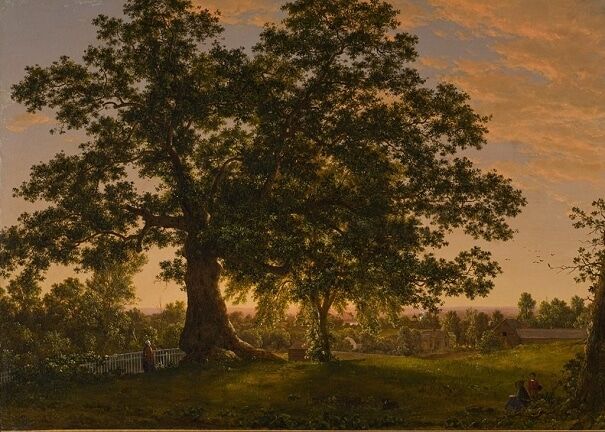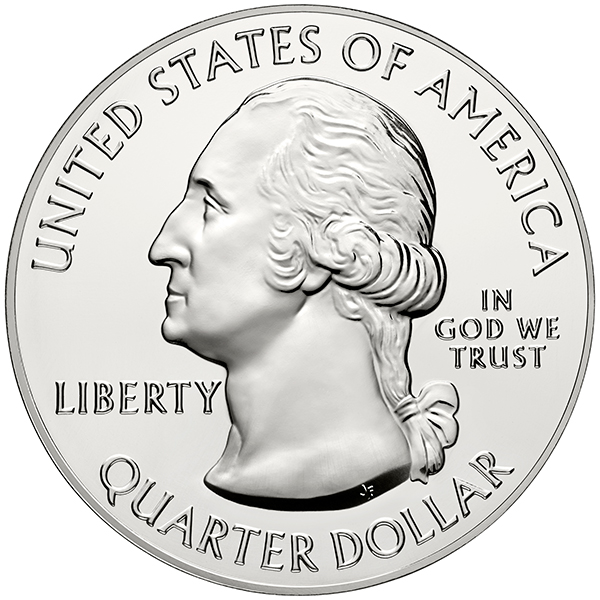
By Charles Morgan and Hubert Walker for CoinWeek Notes ….
Between 1999 and 2008, the 50 State Quarters circulating commemorative coin program honored each state in the order in which it joined the Union. As authorized by Public Law 105-124 on December 1, 1997, five quarters were released every year with a common obverse and different reverses representative of the states being commemorated. The program proved popular with the American public, bringing many new collectors into the hobby.
The 1999 Connecticut State Quarter, released on October 12, was the fifth issue in the 50 State Quarters series and the final issue for 1999. Connecticut became the fifth state to ratify the United States Constitution on January 9, 1788.
The Charter Oak was chosen to represent the state on the new coin. It had been portrayed once before on the reverse of the 1935 Connecticut Tercentenary Commemorative Half Dollar designed by sculptor Henry Kreis. The important difference between the two renditions is that the classic commemorative depicts the tree with foliage while the State Quarter features the oak as it would’ve appeared during winter without leaves.
The Charter Oak
On October 31, 1687, Sir Edmund Andros, Royal Governor of Colonial New York, demanded that Connecticut give up its royal charter and acknowledge his authority over the colony. Connecticut refused, and the conflict lasted for over a decade. Andros and a group of armed troops went to Hartford to meet with the colony’s leaders to accept the surrender of the charter document itself. According to legend, the charter lay on the table between the colonists and the governor as the meeting commenced but then the colonists blew out the candles. When light was restored to the room, the charter was gone.

“The Charter Oak” by Frederic Church, 1846. Florence Griswold Museum
While Governor Andros did force the colony to submit, he never possessed the charter; it is said that it was hidden in the Charter Oak.
The formidable tree, which had been important to Native Americans for hundreds of years before the English arrived, finally succumbed to storm damage in 1856. This makes the 1999 Connecticut State Quarter one of two quarters in the series that depict landmarks that no longer exist; the ninth coin in the series, the 2000 New Hampshire Quarter, depicts the famous New Hampshire rock formation the “Old Man of the Mountain“, which crumbled away in 2003.
How Much Is a 1999-P Connecticut State Quarter Worth?
At a minimum, the value of every 1999-P Connecticut State Quarter starts at 25¢, the face value of the coin. The Philadelphia Mint struck 688,744,000 pieces for circulation, while the Denver Mint struck 657,880,000. As with the other State Quarters, nearly all of these coins entered circulation within a few years of issue. Collector enthusiasm for the program was extremely high in 1999, and untold millions of Connecticut State Quarters were purchased from local banks or for a small premium in specially-marked rolls and bags from the United States Mint. These saved coins will provide future collectors with the possibility to own Mint State examples of the 1999-P Connecticut State Quarter for a long time.
A raw 1999-P Connecticut State Quarter in Mint State sells for a premium over the coin’s 25¢ face value. A fair market value for a 1999-P in Choice to Gem uncirculated condition is between $1 and $3.00.
Perfect MS70 circulation strike coins, while technically possible, are practically unheard of. The typical grade for a Mint State Connecticut State Quater is between MS64 and MS67, according to data published by CAC, NGC, and PCGS. MS67 coins offer the best value for the set registry collector, with such pieces selling for as little as $20 each on sites like eBay. The price jumps to almost $500 for examples in MS68. The record auction result for a 1999-P Connecticut State Quarter is $4,362 in a 2006 Superior Galleries sale. That coin graded MS67, and as previously mentioned, it would not sell for that today. In over 25 years, a single coin has been certified MS69 by PCGS. A public sale of this particular coin might exceed the 2006 record price, but this is no sure thing.
The grading services graded more Denver Mint examples than coins struck at Philadelphia, and the population data reflects that. The difference in quality between coins struck at the two mints is minimal.
* * *
Market Data and Noteworthy Specimens
Top Population: PCGS MS69 (1, 9/2024), NGC MS69 (2, 9/2024), and CAC N/A (0:0 stickered:graded, 9/2024).
- NGC MS68 #3981587-038: Heritage, June 9, 2020, Lot 23147 – $240; Heritage, December 1, 2020, Lot 21329 – $192.
- PCGS MS68 #09956042: Heritage, May 31, 2007, Lot 1052 – $1,380. Larry Shapiro on insert; “The Michael Fuller Collection,” Heritage, November 30, 2007, Lot 60968 – $1,150. Larry Shapiro removed from insert, Michael Fuller Collection now on label; “Charlie O’s Collection,” Heritage, June 18, 2019, Lot 25572 – $480. Michael Fuller Collection on insert.
- PCGS MS68 #72244008: Heritage, December 14, 2018, Lot 7520 – $720.
- NGC MS68 #1836366-068: Heritage, December 25, 2016, Lot 27239 – $119.
- NGC MS68 #1992610-005: GreatCollections, August 11, 2013, Lot 21323 – View.
- PCGS MS68: Bowers and Merena, February 2007, Lot 347 – $1,150.
* * *

Design
Obverse:
The obverse of the 1999-P Connecticut Quarter is the common obverse of the 50 State Quarters series. It shows a modified portrait of George Washington, originally designed by John Flanagan based on a 1786 plaster bust by French sculptor Jean-Antoine Houdon. Sculptor-engraver William Cousins designed the newer rendition of Washington, which remained the quarter’s obverse design through both the 50 State and America the Beautiful Quarter series.
The redesign was necessary in part to accommodate new inscriptions on the obverse that previously were featured on the reverse of the quarter; these obverse inscriptions include UNITED STATES OF AMERICA in a clockwise semi-circular arrangement over Washington’s head, the motto IN GOD WE TRUST to his right, the word LIBERTY to the left below his chin, and the denomination QUARTER DOLLAR counterclockwise along the bottom side of the rim under the first president’s bust. The inscriptions QUARTER DOLLAR and UNITED STATES OF AMERICA were previously located on the reverse of Washington Quarters made from 1932 through 1998; they were relocated to the obverse to allow a wider canvas area for the changing 50 State Quarter designs. The P mintmark for Philadelphia is to the right of Washington’s ponytail.
Reverse:
United States Mint sculptor-engraver T. James Ferrell adapted the original design submitted by Andy Jones for the reverse; Ferrell’s italicized initials TJF are found below the wall near the rim, to the right of the “M” in UNUM.
The most striking aspect of the reverse design is the intricate depiction of the tree’s branches, which fan out over most of the face of the coin. CONNECTICUT and 1788 (the year the state ratified the Constitution) wrap clockwise in two lines above the tree. Under the lowest branches of the oak on the left side but over a brief stretch of ground is the caption THE CHARTER OAK, with the word THE stacked on top of the other two words. At ground level to the right of the tree is a section of stonework wall. In the exergue beneath the ground and the tree is the date of issue 1999 and the motto E PLURIBUS UNUM.
Edge:
Like all coins in the 50 State Quarters program, the edge of the 1999-P Connecticut Quarter is reeded.
Designers
American sculptor John Flanagan’s work in the medallic and metal arts ranks him as one of the best artists of his generation. For almost a century, he has been best known for his Washington Quarter design (View Designer’s Profile).
Andy Jones, then a teacher at Eastern Connecticut State University, submitted the winning design of the Charter Oak to the Connecticut Commission of Arts, which oversaw the design approval process for the quarter.
William Cousins and Thomas James Ferrell were sculptor-engravers at the United States Mint. Cousins retired in 2000, and Ferrell followed suit in 2003. Ferrell died in 2020.
1999-P Connecticut State Quarter Coin Specifications
| Country: | United States of America |
| Year of Issue: | 1999 |
| Denomination: | Quarter Dollar (25 Cents USD) |
| Mintmark: | P (Philadelphia) |
| Mintage: | 688,744,000 |
| Alloy: | Outer layers of .750 copper, .250 nickel bonded to pure copper core |
| Weight: | 5.67 g |
| Diameter: | 24.30 mm |
| Edge: | Reeded |
| OBV Designer: | John Flanagan | William Cousins |
| REV Designer: | Andy Jones | T. James Ferrell |
| Quality: | Business Strike |
* * *
Sources
https://www.nytimes.com/1999/08/22/nyregion/heads-or-tree-the-charter-oak-to-grace-new-coin.html
* * *

